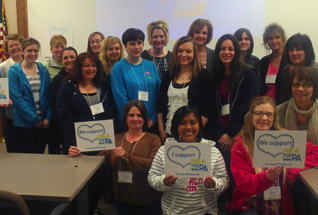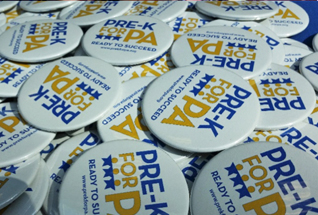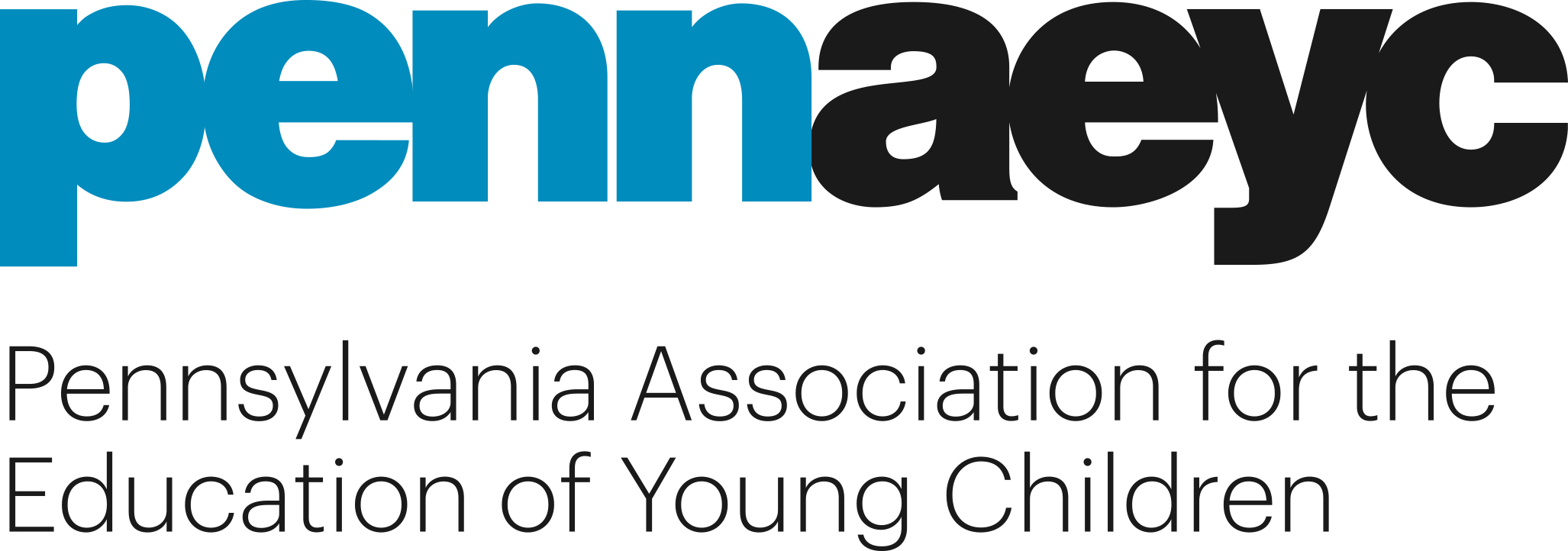Our commonwealth needs to make further investments and improve policies for the children and families served in the early care and education system. Read below for updates and information about Pennsylvania-focused policy and advocacy.



Gov Shapiro's 2025-26 Proposed Budget
FEB 2 HARRISBURG - Gov. Shapiro delivered his third budget address, outlining his spending plan for the 2025-26 fiscal year. PennAEYC applauds the significant early care and education workforce investments in the proposal. These workforce investments are a great step to address staffing challenges in the sector. They will benefit teachers and professional staff, help providers keep classrooms and programs open and have the broader impact of supporting working families, businesses and ultimately, our economy.
We are very happy to share that the Governor’s proposal includes $55 million for a new line item dedicated for child care recruitment and retention. This proposed investment in new, recurring state funding would provide an additional $1,000 per educator for licensed child care programs that participate in the child care subsidy program. This proposed investment is the result of the collective advocacy from providers, educators, families and business leaders who urged the administration to include investments for child care teacher recruitment and retention.
Over the next few months, we’ll be sharing ways you can join us in advocating to secure these funds—and, where possible, increase state budget investments—to better address the child care crisis and its impact on working families and employers. But today, let’s take a moment to thank Governor Shapiro for his commitment to making this happen!
Thank Governor Shapiro for including the new proposed line item to support child care staff.
Summary of Governor Shapiro’s Fiscal Year 2025-26 Early Care and Education Budget Proposal by Line Item
Child Care
- New Child Care Recruitment and Retention Initiative: $55 million
- Child Care Services: $1.6 million increase to support the Governor’s call to raise the minimum wage
- Child Care Assistance: $1.1 million increase to support the Governor’s call to raise the minimum wage
Pre-K
- Pre-K Counts: $17 million increase ($15 million for a rate increase with the remaining funding to maintain the current program)
- Head Start Supplemental Assistance: level fund
Early Intervention
- Early Intervention Part C (DHS – infants/toddlers): $16.2 million ($10 million for a rate increase, $7.4 million to maintain the current program and a revision on federal financial participation for a decrease of $1.3 million)
- Early Intervention Part B (PDE – ages three-five): $14.6 million
Evidenced-based Home Visiting
- Community-Based Family Centers: level funded
- Nurse Family Partnership: small decrease of $67,000 due to a change in federal matching rates
New resource available on Infant/Toddler Early Intervention
We are excited to announce a new resource for early care and education providers and the families you serve about the Infant and Toddler Early Intervention program, which provides services to children who have or are at risk of developmental delays.
This one-page handout includes valuable information on
- Eligibility criteria and the enrollment process
- Available services and how they can support child development
- Contact information for referrals and questions
Download the file in English here Infant and Toddler Early Intervention Handout and Spanish here Spanish Infant and Toddler Early Intervention Handout
New Updated Report: Solving the Child Care Teacher Shortage Through State Recruitment and Retention Investments
Issued by PennAEYC and Start Strong PA the Solving the Child Care Teacher Shortage Through State Recruitment and Retention Investments (Updated Report 2025) report describes how other states are tackling the child care teacher shortage head-on by funding initiatives that help providers better recruit and retain their staff. These 18 states are directly investing in recruitment, retention and other wage impacting strategies to ensure that the supply of child care teachers can meet the demand and keep classrooms open for working families. Some of the states that have made additional investments in recruitment and retention programs also have a child care subsidy reimbursement rate at or above the 75th percentile. This 2025 update includes the states that have documented and shared their outcomes.
State Budget for Fiscal Year 2024-25
The final FY 2024-25 state budget provided the following investments in early childhood care and education:
Child Care
State Funding Update – The budget provides an increase of $26.2 million in the Child Care Services line item to maintain the status quo in the subsidized child care system. The Child Care Assistance line item was level-funded.
Federal Funding Update – Additional federal child care funding will be used so that Pennsylvania meets the federally-recommended child care subsidy reimbursement, lifting provider rates to the 75th percentile of the private market rate. PennAEYC and Start Strong PA supported using these federal funds for this purpose, as it will help programs with more significant participation in the subsidy program address rising costs, but it will have a limited impact on addressing the staffing crisis.
Employer Child Care Contribution Tax Credit - A new tax credit was established for employers who contribute to employees’ child care costs. It becomes effective for tax years after December 31, 2024. The fiscal impact of the tax credit in FY 2024-25 is $8.1 million. This new tax credit comes on the heels of establishing a state Child Care and Dependent Tax credit and improving that credit in the previous two budget cycles. PennAEYC supports tax credits to help families afford child care. However, these demand side initiatives must be paired with solutions to address the supply side crisis occurring due to extremely low wages in the child care sector. Tax credits don’t help if families can’t find child care for their children.
The budget provides a total increase of $17.7 million for high-quality pre-k. This includes an increase of $15 million for Pre-K Counts. The budget agreement requires these funds to be used to increase the rate per child. This results in an increase from $10,000 per child for a full-day slot to $10,500. The Head Start Supplemental Assistance Program received an increase of $2.7 million. PennAEYC is disappointed that the investment in Pre-K Counts is only half of what the Governor proposed and is concerned that Head Start continues to grow at a slower rate than Pre-K Counts. These investments will help providers address staffing shortages and rising costs, but future investment will be needed to serve eligible children without access to the programs and continue to address inadequate wages.
Early Intervention Infant/Toddler Early Intervention received an increase of $9.1 million. This amount reflects the administration’s updated budget request, allowing more children to be served in the program. However, it does not address worker shortages or a needed rate adjustment for providers. Early Intervention for children ages three to school age received an increase of $32.9 million.
Read the Early Learning PA Coalition press release FINAL ELPA Budget Release 2024.
Read the full report here Improving Subsidized Child Care Rate Setting - 2-2023 Web
Improving Subsidized Child Care Rate Setting Presentation February 2023
Presentation Recording; Passcode: Z%ngF2T?
Cost Gap Charts ELRC Regions 1-5 January 2025
Cost Gap Charts ELRC Region 6 -13 January 2025
Cost Gap Charts ELRC Region 14 -19 January 2025
Cost Estimation Modeling Guide
PennAEYC, in collaboration with Start Strong PA, released a cost estimation modeling guide to provide the steps that must be taken to conduct cost estimation modeling and develop an alternative payment methodology to implement a cost based approach to rate setting in a manner which can be approved by the federal government. The Administration must opt to set provider payment rates based on an alternative methodology using a cost estimation model. There are two primary inputs to developing a cost estimation model, expense and revenue data from child care providers and quality cost drivers. The cost estimation model process will result in a tool that Pennsylvania can use to understand the impact of child care program characteristics and policies on the cost of care. When a state knows the true cost of care, these data can be used both to reimburse programs for the cost of operations as well as to gain understanding of what level of additional funding might be necessary to adequately incentivize care for underserved populations. Upon completion of the cost estimation model, Pennsylvania would develop a new payment methodology based on the information collected, along with a plan to fund the gap between current subsidy rates and the cost of providing high-quality child care.
Recommendations for Infant and Toddler Contracts in Pennsylvania: A Model to Strengthen and Stabilize the Child Care System
PennAEYC, Children First, Trying Together and Pennsylvania Partnerships for Children released recommendations for Pennsylvania related to infant and toddler contracted slots to expand and improve the program. Pennsylvania is well poised to expand contracts for infants and toddlers based on the Infant and Contracted Slots Pilot and can serve as a model for strengthening and stabilizing the child care system. These recommendations highlight the policy goals for the expansion of contract-based slots for infants and toddlers and offers well-researched financing and monitoring recommendations to ensure accountability for the system and use of public dollars. Lastly, the recommendations include ways to strengthen equity in a contracts-based model to ensure funding reaches all Early Learning Resource Center regions.
Read the full report here Recommendations for Infant and Toddler Contracts in Pennsylvania: A Model to Strengthen and Stabilize the Child Care System
Statewide Advocacy Agenda to Improve Part C Early Intervention Services for Pennsylvania
PennAEYC and Pennsylvania Partnerships for Children released a comprehensive report, Statewide Advocacy Agenda to Improve Part C Early Intervention Services for Pennsylvania, which reviewed the data and current practices in Pennsylvania’s system. There are five core recommendations:
- Serving all children who can benefit from Part C EI through outreach, referral, enrollment
- Ensuring Part C EI services offer the quality needed to make a difference
- Achieving equitable access in Part C EI
- Addressing mental health needs of infants and toddlers in Part C EI
- Partnering with Medicaid to improve Part C EI
Read the full report here Statewide Advocacy Agenda to Improve Part C Early Intervention Services for Pennsylvania - JUNE 2022 FINAL ONLINE
